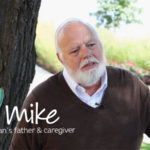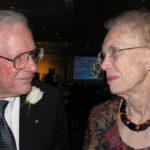Helping them help her

“Grandma always taught us to take care of your family. She took care of us all our lives, so this was the least we could do.”
When Rockford native LaDeta Layne’s grandmother was diagnosed with terminal pancreatic cancer, she knew exactly how she wanted her grandmother’s last months to be: comfortable, surrounded by family, in the hands of those who loved her.
Even with her large support network of family and friends, Layne knew that bringing in Northern Illinois Hospice would provide support to help ease the occasional nerve-racking experiences caregivers encounter while helping terminally ill loved ones.
Her grandmother, Vera Morehead, was hesitant at first about calling hospice, but Layne and her family reminded her that hospice would “help them help her.”
Prior to calling Northern Illinois Hospice, the family researched the cost of a bed, walker and wheelchair and discovered that medical equipment was costly and hard to come by independently, without hospice’s help. “With hospice, we were able to do things and had extra money [because of the Medicare hospice benefit] to help Grandma, and we didn’t have to worry about the expense,” Layne said. “Northern Illinois Hospice offered so many resources, like the medical equipment and medicine Grandma needed.”
Described as a “jazzy woman” who participated in Bible study and loved to shop, Morehead was married for almost 38 years and wore high heels until she was 70. Most Sunday afternoons were spent in the company of family and friends. “Grandma was a hostess,” Layne said. “Her house had a lot of gatherings. Once you are in our family – you’re in. Everyone had keys to her house.”
Morehead’s caring nature also was part of her job. For 20 years, she worked 10- to 12-hour days as a certified nursing assistant at OSF Saint Anthony’s. She was only semi-retired when she was diagnosed with cancer.
“She had a bout of chemotherapy that gave her some more time, but a few months later, it was time to stop treatment,” Layne said. “We waited to call hospice until she was ready.”
It was difficult for Layne and her family to watch such a strong woman experience anxiety, a common symptom in end-of-life diseases. “She was antsy, had heavy breathing and didn’t want to take her medication. It was painful to see,” Layne said. “We felt helpless because we had never seen grandma like that before. The nurses tried hard to make things work. They were great. Even if she wasn’t having a good day, they made sure she didn’t need anything.”
Morehead didn’t always like taking her medicines and sometimes would play tricks on the nurses administering them to her. Layne and her family wanted hospice’s guidance with respect to the medication struggle, but they also wanted to be in control of Morehead’s treatment.
“They were always available, but they didn’t take over,” she said of the hospice staff. “With their help, we didn’t have to deal with the doctor drama that we experienced prior to hospice’s involvement. They were on it [the medication issue] and did what they said they would do. We were even allowed to administer the medication. We totally had control.”
Although the family was offered hospice patient volunteers, Morehead’s family chose to create a schedule that allowed family, friends and fellow church members to take three-hour shifts to be at Morehead’s side.
“Everybody took a shift,” Layne said. “It was not a choice – and we wouldn’t have had it any other way. People didn’t mind doing it for her because she had always given back.”
Morehead’s giving stretched far and wide and included dinner, room and board, and even a check, if needed. She taught Layne and all of those around her to “always treat people right, no matter what.” Layne and her family chose hospice because they thought it was the right thing to do for Morehead.
“I’m not telling what I heard; I’m telling what I know,” said Layne. “My experience [with Northern Illinois Hospice] was wonderful.”
For 35 years, Northern Illinois Hospice has cared for five of Layne’s family members, and her family served as primary caregivers for all.
*Story reprinted with permission




